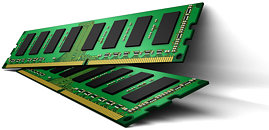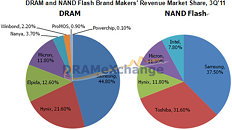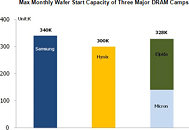Wednesday, January 4th 2012
DRAM Suppliers: Oligopoly The Only Way Back To Profitability?
The random access memory market is a fiercely competitive one. Also, the yearly high PC shipment volume cycles of yesteryear are now history, pushing the various memory manufacturers into the red - and staying there. Well, it seems like Elpida is feeling the pinch more than most, because much of their debt has come from the Japanese government's recapitalization program and must be repaid by the end of April 2012. It looks like they can't pay this off so easily and due to this pressing deadline are looking for cash wherever they can get it, so it looks like merging with one of their rivals such as Toshiba or Micron might help them out of this predicament. Ultimately though, everyone in the DRAM market is hurting now, so it looks like fewer players are needed, so that they can work more like an oligopoly to return to profitability.
While great for helping them to survive, this isn't such good news for the end customer, who will end up seeing higher prices for their memory and a much slower decline in prices, if any. There's lots of detailed analysis and facts and figures over at X-bit labs.
While great for helping them to survive, this isn't such good news for the end customer, who will end up seeing higher prices for their memory and a much slower decline in prices, if any. There's lots of detailed analysis and facts and figures over at X-bit labs.



9 Comments on DRAM Suppliers: Oligopoly The Only Way Back To Profitability?
But I'd rather do what it takes to keep all these companies afloat, keeping them with a competitor status, then let them die out, so that the ones that are left can turn their business into a monopoly. The price to pay later would be way higher, if the latter was to happen.
Hardware is affordable. You've got various price segments for every hardware part. And another advantage of knowing how to build a computer by parts is not having to buy them all in one run.